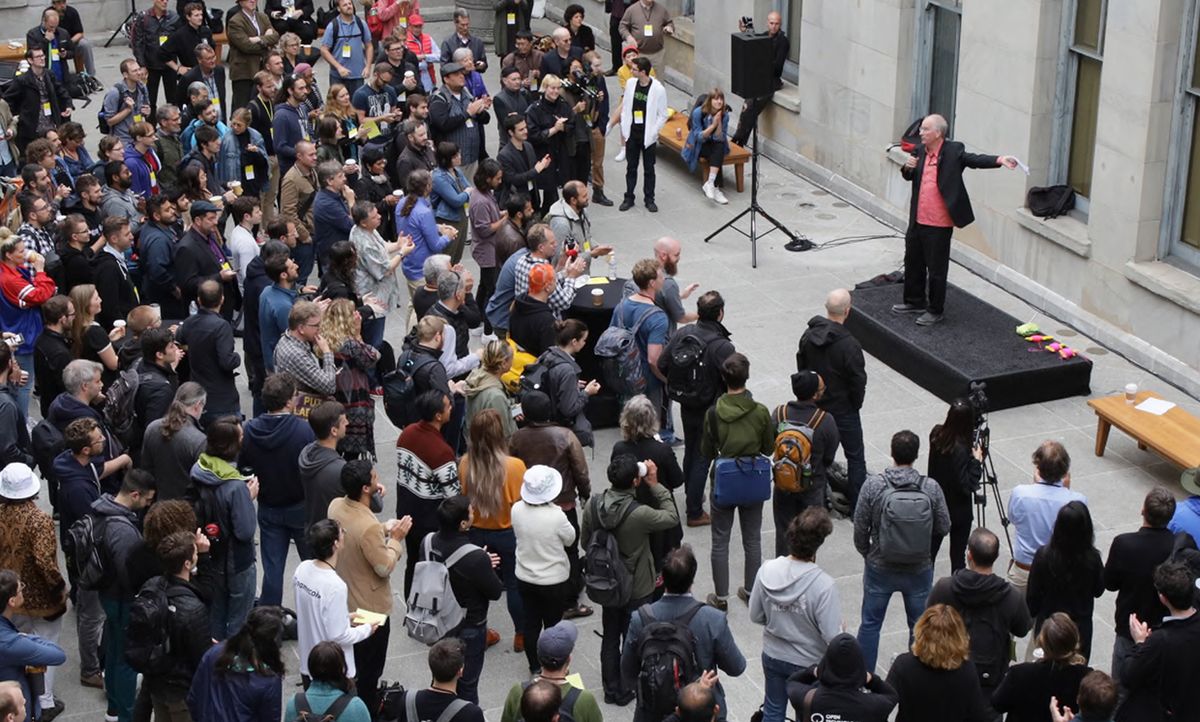Two years ago, the decentralized Web was just a twinkle in the eyes of a few visionaries. In this picture of a future Internet, content leaves today’s silos, like Facebook and Flickr. It duplicates and splits and scatters among hosts around the world, and this distribution protects it from loss, increases privacy, and reduces the power of governments to control it.
The decentralized Web isn’t here yet. But it now has thousands of people working hard to make it happen. It also has an acronym—DWeb—which may sound trivial, but the catching on of an acronym often seems to smooth the road ahead for a technology that will require agreement on a host of things big and little. And some of the main browser providers are taking it seriously and making preparations to access it.

Which is why, says Brewster Kahle, it’s time to organize a DWeb Camp. Kahle, founder of the Internet Archive and organizer of the first Decentralized Web Summit two years ago, sees DWeb Camp as Hackers Conference meets Burning Man, bringing people working in the trenches to develop the DWeb infrastructure together with high-level visionaries to create some solid technology that can be demonstrated.
This month, Kahle is catching his breath after organizing the second Decentralized Web Summit, held in San Francisco in August. It was a much different gathering than the first summit, with far different goals.
“The first one was a call,” he said in a recent phone interview. “Along the lines of ‘Wouldn’t it be great if X?’ ‘We should all work on this.’ ‘You may not know, but it is possible to do blank.’ ” About 300 people attended that first meeting.
The 2018 Summit brought together people who could demonstrate working code, Kahle said, along with “people who can influence the evolution of the Web who aren’t ordinary tech-bro-startup-conference-goers; people who could bring in different perspectives.”
Kicking off the event, held 31 July through 2 August, Kahle urged, “Let’s build a game with many winners, not just one monopolist…where there is no centralized control. The World Wide Web was that way. It was welcoming, it was open, it was infuriating. Lots of people could play.”
Today, he continued, “I no longer feel like a player, I feel like I’m being played. Let’s build something that invites people in. Let’s build a decentralized Web, let’s lock the Web open for good, let’s bake in our values, let’s make freedom of the press irrevocable, let’s build a system we can depend on, a system that doesn’t feel creepy.”
The Summit was productive, Kahle said. “People came away thinking not just that this is going to happen, but that it is happening, and now they have to figure out their roles.”
Some 900 researchers, developers, tech executives, designers, activists, artists, lawyers, and students attended, including, Kahle said, representatives from companies that make browsers like Chrome, Firefox, and Brave.

Having those kinds of people created “a buzz of forward motion,” Kahle said. At one point, he recalls, he was talking to Tim Berners-Lee in a hallway about the things a distributed Web needs from browsers.
Then, Kahle recalls, Berners-Lee noticed “the guy who runs Chrome, and immediately kicked off a conversation about what could be done.”
Even Mike Judge, cocreator of the television show HBO Silicon Valley, attended along with two researchers for the show. Decentralized Internet technology has been fodder for the show in the past, helping to bring attention to the concept. In past episodes, the television show missed the idea, Kahle said, that the vision of the DWeb involves an infrastructure that is based, for the most part, on open-source projects. “I think they learned a lot from participating in the Summit,” Kahle said.
Key signs of progress on the road to the DWeb, Kahle said, include:
A demonstration of the Internet Archive’s dweb.archive.org. “I don’t want to overstate how well it is working,” Kahle said, “but it is kind of working, and that is exciting.”
Mozilla has released experimental APIs along with developer tools for building DWeb applications.
The fact that at least 100 people are working on the Protocol Labs IPFS project, an effort to develop a protocol for the decentralized Web (in the same way http is the protocol for the current Web).
Tim Berners-Lee is leading a project called Solid, a spinoff from the Massachusetts Institute of Technology, aimed at developing tools for building decentralized social applications.
In spite of all this activity, Kahle says, “we are still prelaunch,” and there’s much work to do. “We need to have the Web browsers get better in order to support the decentralized Web at scale, we need applications that are interesting and fun, and we need the inputs from people… who are regularly dealing with surveilled, spotty, or barricaded networks.”
It’s a good time to push forward, Kahle pointed out, “because we have a great deal of sensitivity to some of the failings of the current Web—the last presidential election cycle, the Snowden situation, examples of ad networks gone berserk—at the same time that there is a lot of money running around; times are good, so people can work on trying to fix this thing.”
Which brings us back to DWeb Camp. “I would really love to have a decentralized Web camp,” Kahle said. “Right now, the pieces of it are developing in isolation, people are working on blockchain pieces here, payments over there. Let’s weave it together. Let’s hack this stuff out. We will do so much more by working together.”
Tekla S. Perry is a senior editor at IEEE Spectrum. Based in Palo Alto, Calif., she's been covering the people, companies, and technology that make Silicon Valley a special place for more than 40 years. An IEEE member, she holds a bachelor's degree in journalism from Michigan State University.



